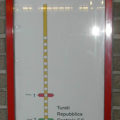A reader has just written to me:
“One was on an essay about Religion as a Cause of Strife in the World – you can bet she went to town on that!”
this is a comment you wrote on Ross’ India Diary and i have always wanted to ask you why you believe that Ross has arrived at an independent opinion/thought/decision regarding religion when it is the exact same opinion/insight you and your husband have. maybe mistakenly, but i’ve gotten this impression that you are very prideful that her belief is identical to yours and see it as a sign of her independent, intelligent thought. how much of a stretch is that really? how different is that to the child who grows up with the gospel every week at church and every day at home? how “independent” can that child’s outlook ever be due to that home conditioning?
It’s very true and completely unsurprising that Rossella, like most kids, shares her parents’ beliefs (or lack of). The more interesting question is: did how she arrive at those beliefs?
One of Richard Dawkins’ most provocative theses is that schools and even parents should not be allowed to proselytize children into religion at young ages. He points to lifelong traumas (both physical and mental) inflicted upon people (and cultures) from infancy, in the name of religion.
One might reasonably ask (many have) how Dawkins’ desire to promote atheism is any different from a religious person’s desire to promote religion. The logic here seems to be: “Atheism is just another belief. Why is it okay for you to preach what you believe, but not for religious people to do so?”
Here’s the “fundamental” difference: most religions teach their adherents – and particularly children – to accept certain strictures, norms, behaviors, etc. because someone in “authority” said so. Believers may be allowed to question up to a point, but sooner or later every religion comes down to “faith” – a necessarily blind (because unprovable) belief that there is some “higher power” out there which has an opinion about how you should think and act.
This is emphatically NOT how we raised our daughter.
My husband is a professional mathematician. This means that he thinks long and hard to come up with new hypotheses about how things behave in his particular realm of mathematics. When he can support his ideas with mathematical proofs, and those ideas are new, and important enough to be brought to the attention of his colleagues, he submits them (in the form of articles) to professional mathematical journals. There his ideas are judged by his peers for their truth and interestingness and worthiness of publication. If he gets something wrong, either he or one of his colleagues will figure that out. He thanks the people who point out his errors, and goes back to the drawing board.
The same thing happens in every scientific field. Ideas are developed, tested, and submitted to a jury of one’s peers. Sometimes an idea is proven wrong immediately, sometimes later, as more research is carried out. A few hypotheses survive the judgement of the scientific community and the test of time to become theories: which is to say, scientifically-proven facts.
All of this is done in a spirit of cooperative enquiry and (more or less) humility. No one can claim to know more than anyone else on the basis of some externally-granted “authority” – a scientist must be able to back his or her hypotheses with solid, provable facts.
I’m not a scientist, but I use the classic scientific method in my job every day: Does this work? If not, why not? What went wrong? Test one variable at a time til you find out where the problem is, then fix it. It’s a simple logic which can be usefully applied in many areas of life.
Given our professional and personal biases (and our penchant for arguing about EVERYTHING), Enrico and I have raised our daughter to prize inquiry, and not to grant authority blindly. We would be hypocrites if we had not encouraged Ross to think for herself and ask questions – to which we always gave grown-up answers.
This isn’t a totally easy way to raise a teenager: “Why do I have to be home at midnight?” In a family like ours, “Because I’m the mom and I said so!” doesn’t cut it. In Ross’ most exhausting, argumentative moments, I have gritted my teeth and consoled myself that: “At least I know she’s not going to do something stupid just because her friends are doing it.”
And, mostly, she hasn’t. We raised her to think for herself, and she does think – and, most of the time, she comes to very sensible conclusions.
If Ross called herself an atheist simply in imitation of me and her father, I’d have no reason to boast of her independence of mind. Perhaps at 18 she hasn’t put as much thought into her beliefs as we have, but I don’t think she’s merely parroting us. She knows that she is welcome – encouraged! – to explore what others believe (Woodstock is an excellent venue for that), and decide for herself what she thinks of it all. Her father and I remain open to discussion. Ross is no fool, and very likely someday she’ll persuade me to something I hadn’t previously agreed with. It wouldn’t be the first time.



